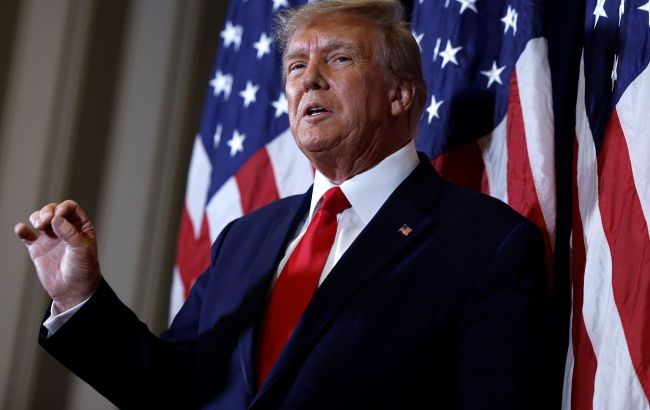Europe cautiously optimistic about Trump's stance on Ukraine - Bloomberg
 Photo: Donald Trump (Getty Images)
Photo: Donald Trump (Getty Images)
Ukraine's European allies are cautiously optimistic that US President-elect Donald Trump will not force Kyiv to enter into premature talks with Russia, Bloomberg reports.
This conclusion was made after a series of private talks with members of the Trump team, during which the transatlantic partners justified the need for further support for Ukraine, according to anonymous European officials.
According to them, the exchange of views raises the possibility that the new administration can help war-torn Ukraine return to a position of strength before any negotiations begin.
However, those who have conducted private talks warn that they do not know what the incoming president will do, who has a history of rejecting advice or changing his position at the last minute.
According to the Europeans, Trump officials appear to be receptive to two arguments: that the new US leader risks a humiliation comparable to President Joe Biden's chaotic withdrawal from Afghanistan if he cuts off Kyiv's oxygen, and that allowing Russia to achieve such a victory would only push China to consider more aggressive steps.
A week before he is sworn in as the 47th president, it is still unclear how Trump will handle Russia's war against Ukraine, which is approaching the three-year mark. With planners on Trump's team tossing around several ideas, there is no action plan for Ukraine that can be implemented after the Jan. 20 inauguration, European and Ukrainian officials said.
However, the talks sparked a sense of cautious relief in European capitals, where officials were mulling over worst-case scenarios in case Trump follows through on his promise to end the war quickly and possibly strikes a deal that would push Kyiv back and strengthen Russian President Vladimir Putin's hand.
Meeting in Mar-a-Lago
Italian Prime Minister Giorgia Meloni, a supporter of Ukraine who also strengthened her ties with Trump by visiting his Mar-a-Lago estate in Florida this month, said she does not envision a separation from Ukraine and emphasized the logic of strengthening Kyiv's position.
“The only way to force Russia to sit down for talks is to build a difficult situation for them,” Maloney said last week after meeting with Trump and his allies. “Trump has the ability to use both diplomacy and deterrence,” she added, ”and I expect this will happen this time, too.”
At the very least, Trump's campaign promise that he would end Russia's war against Ukraine before his inauguration is off the table. His nominee for special envoy for Ukraine and Russia, Keith Kellogg, said last week that he would like to see a solution found within the first 100 days of the administration.
A quick solution to the war is “now unlikely — and we’re hearing that actually the timetable has moved down somewhat towards Easter,” said British Foreign Secretary David Lammy. He said he saw “no evidence that Putin wants to come to the table.”
With Russian troops advancing and seizing territory in eastern Ukraine, Moscow has no incentive to engage in negotiations as it strengthens its position. Russian Foreign Minister Sergei Lavrov rejected Trump's call for an immediate ceasefire last month, calling it a "road to nowhere."
Officials on Trump's team are weighing in. Michael Waltz, Trump's top aide and national security adviser, has made it clear that Ukraine will be asked to lower its conscription age to strengthen its position on the battlefield ahead of any settlement.
But European leaders, including German Chancellor Olaf Scholz, expressed some surprise after speaking with Trump at the president-elect's openness to a solution. according to European officials, Trump asked intelligent questions about the war in meetings and phone calls with Europeans.
Trump expressed interest in overseeing the deal of the century when it came to Ukraine, the sources said. He also expressed criticism of Putin's behavior, they said.
However, the president-elect gave the impression that he was not overly interested in Ukraine's fate or did not realize the strategic importance of the war to US interests, the people said
Position of strength
Leaders of European capitals are increasingly convinced that an agreement to end the war will be reached in the foreseeable future. It is hoped that tougher sanctions against Moscow and persistent military support for Kyiv will impose economic and military costs on Russia and create an opportunity for negotiations on Ukraine.
Last week, the United States and the United Kingdom imposed the toughest sanctions yet on Russia's oil industry, targeting two companies that account for more than a quarter of Russia's oil exports by sea.
According to many officials, despite the campaign rhetoric against Ukraine, the Trump team is aware of the consequences of a failed war, especially with the withdrawal of troops from Afghanistan.
When it comes to finding a solution, there is a recognition that any agreement will have to include some form of security guarantees for Kyiv, they said. This will inevitably lead to a tense debate about whether US troops should be sent if Ukraine is attacked after the ceasefire, an essential element to ensure European support.
Kellogg suggested maintaining the level of support for Ukraine so that it can negotiate from a position of strength. He outlined a potential deal that would include freezing the current front line and creating a demilitarized zone while postponing the issue of Ukraine's NATO membership “for an extended period.”
Ukraine's membership in NATO, which is one of Russia's main demands, is unlikely to move forward with Trump, according to European officials. However, the Europeans want to keep the issue on the table, they said.
US President-elect Donald Trump intends to meet as soon as possible with Vladimir Putin, on whom, according to him, the end of the war against Ukraine depends.


